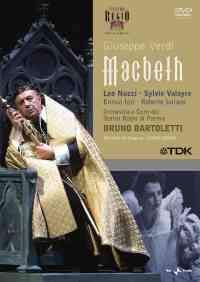|
Back
05/14/2011
Giuseppe Verdi: Macbeth
Leo Nucci (Macbeth), Enrico Iori (Banquo), Sylvie Valayre (Lady Macbeth), Tiziana Tramonti (Dama di Lady Macbeth), Roberto Iuliano (Macduff), Nicola Pascoli (Malcolm), Enrico Turco (Un medico), Davide Ronzoni (L’araldo), Riccardo Di Stefano (Un domestico), Noris Borgogelli (Il sicario), Orchestra and Chorus of the Teatro Regio di Parma, Martino Faggiani (Chorus Master), Bruno Bartoletti (Conductor), Compagnia Balletto di Roma, Amedeo Amodio (Choreography), Liliana Cavani (Stage Director), Dante Ferretti (Set Designer), Alberto Verso (Costume Designer), Sergio Rossi (Lighting Designer), Andrea Bevilacqua (Video Director)
Recorded live at Teatro Regio di Parma (June 2006) – 156’
ARTHAUS MUSIK Ref. #: NTSC 107 313 – Picture Format; 16:9 – Sound Format: PCM Stereo, Dolby Digital 5:1 – Region Code: 0 – Subtitles in English, German, French, Spanish, Italian – Booklet in French, English, and German

Famed Italian movie director Liliana Cavani (The Night Porter, Ripley’s Game, The Berlin Affair, etc.) has also made some valuable contributions to opera: La traviata, Manon Lescaut at La Scala (1992, 1998), Cavalleria rusticana (1996), and, more recently, Alceste (2005) in Parma. With Macbeth (2006) at Teatro Regio di Parma, Cavani fails to entirely convince with her reading of Verdi’s opera. Her wanton “play within the play” effect does not offer any new insight to the story. If anything, it causes distraction and practical problems. The set represents the inside of a XX century theater during World War II (evoked before and during the introduzione by search lights panning the dark sky and the dreaded wail of the air-raid siren), with spectators singing along (?) as they watch the opera itself set during the Renaissance. The witches – here washerwomen – are gathered around a fountain, with nothing uncanny about them. Lady Macbeth reads her letter while jostling a court dwarf who most likely stands for King Duncan and the minor obstacle he represents to her ambition. Alas, this is by no means a novel idea. Likewise, hardly any creativity is shown in staging the true difficulties of the drama: the dagger scene, Banquo’s ghost (or absence thereof), the apparitions, the Forest of Birnham. As a serious consequence, the supernatural dimension of the work is lost. There are some striking moments in this production, though. “La luce langue” in Act 2, with Lady Macbeth reluctantly seducing her husband, is effectively handled. So is the chorus, kept in the dark against a violently lit empty scene, during the “Patria oppressa” of the Scottish refugees. Admittedly, the rich period costumes by Alberto Veso, especially in the banquet scene, are splendid.
The opera is given with the ten-minute-nine-minute-too-long ballet composed for the Paris performances. Amedeo Amado’s choreography has little to offer, and the erotic contortions by the fountain are tedious and inconsistent with the plot.
Ensuring she gains the audience attention at all times, Sylvie Valayre’s Lady Macbeth is highly convincing. Her portrayal of the character’s obsessive descent into madness is intense and imaginative. The voice occasionally shows signs of wear and tear with an uneven coloratura in the Brindisi, a propensity to skip some consonants, and a not so Italianate sound in vowels. However, Valayre’s atypical soprano allows her to sing with full tone, nuanced colors, and formidable attacks. Her renditions of the first act cabaletta “Vieni, t’affretta”, “La luce langue” (Act 2), and of the sleepwalking scene (Act 4) which she appropriately ends on un fil di voce, are worthy of praise.
With Rigoletto, Renato, and Iago, Macbeth is one of Leo Nucci’s signature roles. The then sixty-four-year-old Verdi baritone still shows vocal health and the years do not seem to have excessively diminished his sonorous voice. A little bit of dryness here and there, but an overall penetrating performance, with expressive interaction in the duets with Lady Macbeth, and a stirring, intense “Pietà, rispetto, amore” in the final act. Supporting roles are suitably sung. Enrico Iori (Banquo), with his sizeable bass and commanding presence, pens a stylish “Come dal ciel precipita”. Roberto Iuliano (Macduff) demonstrates solid technique in “Ah, la paterna mano” but the voice lacks sparkle in the high register. Tiziana Tramonti (Lady Macbeth’s lady-in-waiting), Nicola Pascoli (Malcolm), and Enrico Turco (the doctor) are exemplary.
At the helm of the Teatro Regio’s orchestra, Bruno Bartoletti, a respectable conductor, is uneven in his reading of the score. While he offers laudable support to the singers, the choice of idiosyncratic tempi is questionable. The chorus, trained by Martino Faggiani receives a well-deserved ovation at curtain calls.
The sound quality of this DVD is exceptional while camera-work and editing by Andrea Bevilacqua are arguable. The video director holds shots for a very short time before moving to another one. It is annoying and unwarranted, unless, of course, the director assumes that our attention span is very limited. Excessive use of inelegant headshots is also to be mentioned.
The Sleepwalking Scene
Christian Dalzon
|